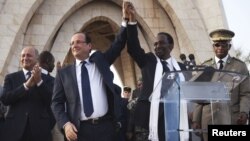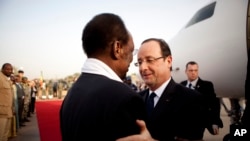Residents of Timbuktu danced, drummed and cheered in the streets Saturday as they welcomed French President Francois Hollande. These expressions of joy were forbidden by the al-Qaida-linked militants in control of the town just one week ago.
President Hollande said later in his speech in Bamako that the 4,600 French troops involved in Operation Serval, most of them on the ground in Mali, were fighting "as brothers" alongside the Malians.
Hollande says "town after town, village after village, the French and Malian armies supported by regional troops have finally returned to Mali its unity, territorial integrity and strength. The terrorist," he says, "has been pushed back. He has been chased out, but he has not yet been beaten."
The French military intervention began, at the request of the Malian government, on Jan. 11, less than two days after the rebels, in control of the north since April, launched a surprise offensive south.
Mali's army, already weakened by military defeat in the north and a coup in the south last year, could not have held them off on their own. French aircraft have carried out daily bombing campaigns against militant targets throughout the north and French ground troops have deployed as far north as Kidal.
Many of the rebels had already fled the main towns, dispersing among the population and seeking cover in the dunes and mountains of the far north, according to military sources.
The shadow of a grisly guerrilla war to come hangs over the country even as Malians celebrate in the victories of the past three weeks.
Hollande says the terrorist groups have been weakened and suffered large losses but have not disappeared. He says troops will keep hunting them down, and France will stay at Mali's side as long as it takes, meaning, he says, until the regional African force that is still deploying to Mali is ready to take over the fight alongside the Malian army.
Hollande sought to reassure Malians, saying that French soldiers are not there to advance French interests or take sides but to fight terrorism in the region and the world.
The crowd in Bamako waved flags from both countries. One woman had painted a heart-shaped French flag in the middle of her Malian one. Another waved a sign that read, "Merci, Papa Hollande."
Mali's interim president, Diouncounda Traore, said Saturday that without French help, Mali would be no more.
Normalcy remains a long way off for the country. More than 400,000 people have fled the north in the past year. Humanitarian groups say that number could as much as double in coming months if fighting continues.
Recent victories come amid reports from human rights groups that Malian soldiers and residents of liberated towns are taking revenge against suspected militants and perceived rebel supporters from the Arab, Tuareg and Peul ethnic groups.
Both presidents urged Malians to respect human rights.
Traore defended the Malian army, calling its behavior during the campaign "quasi-exemplary." He said "no misconduct, no reprisals, no revenge killings" will be tolerated. He says people committing abuses are acting on their own and will be held accountable.

